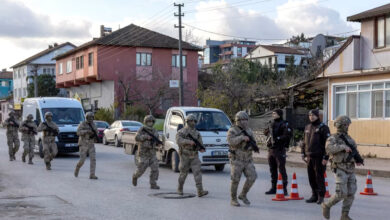
ISTANBUL (Reuters) – Turkey’s inflation rate dropped to single figures in September for the first time in more than two years, data showed on Thursday, giving the central bank more room to cut interest rates further.
The consumer price index fell to 9.26% year-on-year, the Turkish Statistical Institute said, well down from 15.01% in August due to temporary measurement “base effects”, and below a Reuters poll forecast of 9.6%.
Prices spiked a year ago as Turkey’s currency crisis took hold and tipped the economy into recession.
Inflation is expected to rebound by the end of this year to around 12-13%, but still leaves room for the central bank to ease policy a bit more after it slashed interest rates by 750 points since late July to 16.50% three weeks ago.
“These figures mean that President Erdogan is likely to keep up the pressure on the central bank for further large interest rate cuts,” said Jason Tuvey of Capital Economics.
Analysts expect one or two modest cuts in interest rates by the end of the year.
Month-on-month, consumer inflation stood at 0.99% in September, well below a Reuters poll forecast of 1.3%. The largest price drops were in food and non-alcoholic drinks, the statistical institute said.
The Turkish lira – which plunged nearly 30% in 2018 and is down another 7.5% this year – strengthened by 0.2% after the inflation report and stood at 5.7080 against the dollar at 1303 GMT.
Inflation surged in September of last year and hit a 15-year high above 25% in October, before gradually easing. The government expects it to fall to 8.5% by the end of next year, and help the economy to expand 5% in 2020, up from expected growth of just 0.5% this year.
Many analysts, however, are skeptical of such a sharp recovery and worry that Ankara will push the central bank to ease monetary policy too quickly. President Erdogan appointed a new central bank chief in July because the bank was not cutting rates enough in his view.
“Any further easing would likely put pressure on the (lira), unless the pace of easing is in line with or slower than the rate of decline in inflation, or G3 central banks start to surprise in a dovish direction again,” Goldman Sachs analysts wrote in a note.
Finance Minister Berat Albayrak told broadcaster A Haber in an interview on Thursday that year-end inflation would meet the 12% forecast set this week in Turkey’s new economic program and may even be lower than that.
Turkey’s producer price index was up 0.13% month-on-month in September for an annual rise of 2.45%, the official data showed.
DOLLARIZATION
Economists have also been concerned by Turks flocking to the U.S. dollar and other currencies in the wake of last year’s currency crisis. Foreign exchange held by Turkish locals rose to a record high of $193.69 billion as of Sept. 27, according to central bank data released on Thursday.
While the government has vowed to combat dollarization, Albayrak said on Thursday that the government would implement new steps to boost the lira.
“We will see steps in the coming period that will have a strong positive impact on the lira in terms of dollarization,” Albayrak said.
“With the steps we will take in the coming period, the improvement in dollarization will continue,” he added.
Additional reporting by Nevzat Devranoglu; Writing by Jonathan Spicer; Editing by Tuvan Gumrukcu/Dominic Evans/Susan Fenton
FILE PHOTO: A discount sign is seen at a tourist shop at the historical Grand Bazaar, known as the Covered Bazaar, in Istanbul, Turkey, May 23, 2019. REUTERS/Murad Sezer/File Photo




